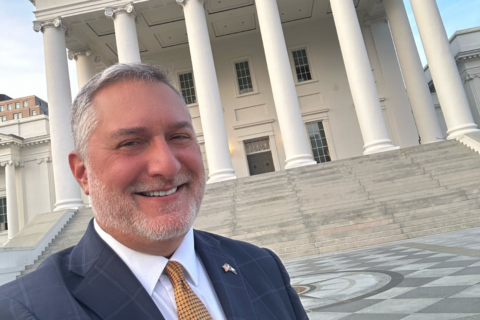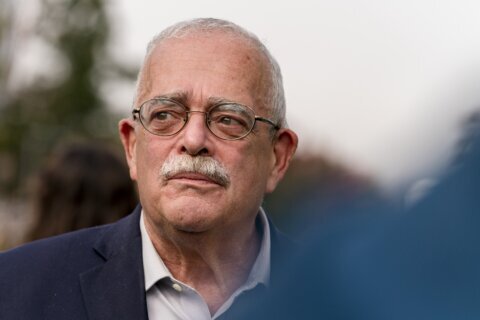WTOP spoke with Virginia Rep. Jennifer Wexton in an exclusive interview earlier this month about resources for people with disabilities, and she answered in her own words. Listen below.
When Jennifer Wexton rises Thursday to speak on the House floor, something she has done countless times before, the congresswoman will be using a voice she thought was gone forever.
After a rare neurological disorder robbed her of her ability to speak clearly, Wexton has been given her voice back with the help of a powerful artificial intelligence program, allowing the Virginia Democrat to make a clone of her speaking voice using old recordings of speeches and appearances she made as a congresswoman. She will use that program to deliver what is believed to be the first speech on the House floor ever given via a voice cloned by artificial intelligence.
“It was a special moment that I never imagined could happen. I cried happy tears when I first heard it,” Wexton told The Associated Press, seated at her dining room table in Leesburg, Virginia, the first interview she conducted using the new artificial intelligence voice clone. Wexton’s voice played out of her iPad, propped up using a rainbow-colored floral case. The congresswoman types out her thoughts, uses a stylus to move the text around, hits play and then the AI program puts that text into Wexton’s voice. It’s a lengthy process, so the AP provided Wexton with a few questions ahead of the interview to give the congresswoman time to type her answers.
Wexton was diagnosed with progressive supranuclear palsy in 2023, an aggressive neurological disorder that impacts many aspects of life, including speech.
The congresswoman, whose runaway win in 2018 signaled the success Democrats would have that year, initially announced a Parkinson’s diagnosis in April 2023, striking an upbeat tone by telling supporters they were “welcome to empathize” with her, but not to “feel sorry for me.” Her tone in September 2023 was vastly different: She described her PSP diagnosis as “Parkinson’s on steroids” and said she would not seek reelection in 2024.
As it became more difficult for Wexton to use her voice, Wexton turned to a traditional text-to-speech app that many people with speech disorders often use. The voice sounded more like a robot than a human, but she used it to conduct interviews and give speeches.
ElevenLabs, a start-up with one of the most widely used AI-powered voice cloning models, saw Wexton speak using the older technology. They contacted her office several weeks ago and Wexton’s aides provided the company with several recordings, mostly speeches she had given as a member of Congress.
Wexton told the AP she first used the cloned voice to speak with Joe Biden in the Oval Office earlier this month when the President signed the National Plan to End Parkinson’s Act. A few days later, Wexton publicly debuted her cloned voice in a video, leading to an outpouring of support and thrusting the congresswoman into a debate over artificial intelligence.
“This is never a situation I imagined myself in,” she said. “I didn’t anticipate being at the forefront of a debate over the future of AI.”
Using AI-powered cloning to give Wexton her voice back is one of the positive applications of this technology. However, voice cloning has also been used nefariously, like defrauding people and pushing fake political messaging.
Wexton harbors those questions, too. After she debuted her voice clone, Wexton jokingly texted a few friends the same message: “AI isn’t entirely evil, just mostly.” And she believes more guardrails are needed. Her team of advisers has taken precautions to make sure her likeness is protected.
Wexton also said the technology isn’t perfect. Because the audio used came from speeches and public events, it isn’t great for regular conversation, often making everything sound “like some big proclamation.” Her two college-aged sons, she said, don’t like it.
“At the end of the day, it will never be me. But it is more me than I ever could have hoped I could hear again,” she said. “I plan to make the most of it.”
For doctors like Jori Fleisher, the Director of Rush University Medical Center’s CurePSP Center of Care, that sentiment is why this kind of technology could be life-altering for those diagnosed with the rare neurological disorder.
“To know of and already deeply respect Representative Wexton and then hear her speak so beautifully in her own voice, using her own words through this technology, it is giving me goosebumps now,” she said, growing emotional.
“I want to be a voice, even an AI voice, for Americans facing accessibility challenges and other disabilities because too often people only see us for that disability,” Wexton said.
—
The Associated Press receives financial assistance from the Omidyar Network to support coverage of artificial intelligence and its impact on society. AP is solely responsible for all content. Find AP’s standards for working with philanthropies, a list of supporters and funded coverage areas at AP.org
Copyright © 2025 The Associated Press. All rights reserved. This material may not be published, broadcast, written or redistributed.









